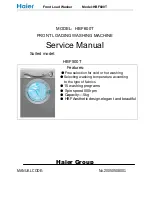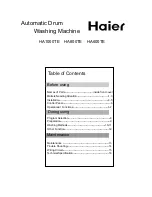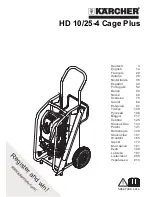
Summary of Important Safety Information
72
During use
•
Safety latch locked before starting engine.
Always engage the safety latch on the spray gun
trigger before starting the engine.
•
Incoming water supply on.
Do not run the pump without the water supply connected and turned
on. Operating the pressure washer without an incoming flow of water will damage the pump.
•
Wait before re-lighting burner.
NEVER attempt to immediately run or re-light the burner if it
doesn’t ignit
e the first time. Unburned fuel may have accumulated, causing potential explosion or
fire hazard.
•
Use two hands.
Pressure washer spray gun kicks back when triggered. Firmly grasp with two
hands.
•
Stay alert.
Watch what you are always doing.
•
Prevent slips / loss of balance
. High-pressure spray could cause you to lose balance from kickback
forces, and wet surfaces can be slippery.
•
Always keep good footing and balance.
•
Do not overreach.
•
Do not stand on unstable support when spraying.
•
Use extreme caution when spraying from a ladder or scaffolding, ensure it is firmly
anchored from sway or tip-over. Use extreme caution to avoid falling as spray gun kick
can propel you off the ladder or scaffolding.
•
Be aware of puddles and slippery surfaces. Ensure there is adequate drainage to prevent
pooling of water.
•
Keep spray away from people.
Never direct discharge stream at or near any person. Do not allow
any part of the body to come in contact with the fluid stream. High-pressure spray will cause serious
skin, eye, or falling injuries, and hot water can burn. Injection injury will occur if high-pressure
spray pierces the skin, injecting liquid under the skin. Injection injury can result in blood poisoning
and/or severe tissue damage leading to infection, gangrene and possibly amputation.
•
Prevent surface damage & flying debris
–
Surfaces being sprayed must be strong enough to
withstand high-pressure spray, or damage may result. In addition, high-pressure spray will dislodge
unsecured objects as well as surface chips and debris, resulting in hazardous flying objects that can
cause personal injury or property damage. Do not spray brittle surfaces or breakable, fragile, or
unsecured objects such as:
o
stucco or laminar flagstone
o
some painted surfaces
o
windows or glass doors (because they may break)
o
light fixtures, flowerbeds, mailboxes
o
unsecured, lightweight objects
•
Do not lock spray gun trigger in ON position
. To reduce risk of injury, do not attempt to secure
the spray gun open by blocking or tying the spray gun in the open position.
•
Keep spray away from electrical wiring
. Spray contact with electrical wiring will likely result in
severe electrical shock or electrocution.
•
Use only approved cleaning chemicals.
Only chemicals specifically designed for use in pressure
washers may be used. Never spray acids, corrosives, or abrasive or flammable liquids. Breathing
hazards, surface burns/corrosion, or fire/explosion could result.
•
Follow cleaning chemical manufacturer’s instructions.
Follow the chemical manufacturer’s
label
instructions when handling or spraying chemicals. Understand all safety hazards and first aid for all
chemicals being used. Wear protective gear as directed. Always wear protective gloves when
handling and cleaning with chemicals. When cleaning filters, check whether dangerous chemicals
have been used with the filter and take any precautions that may have been recommended by the
supplier of these chemicals. Always dispose of hazardous fluids per local, state, and national
guidelines.







































